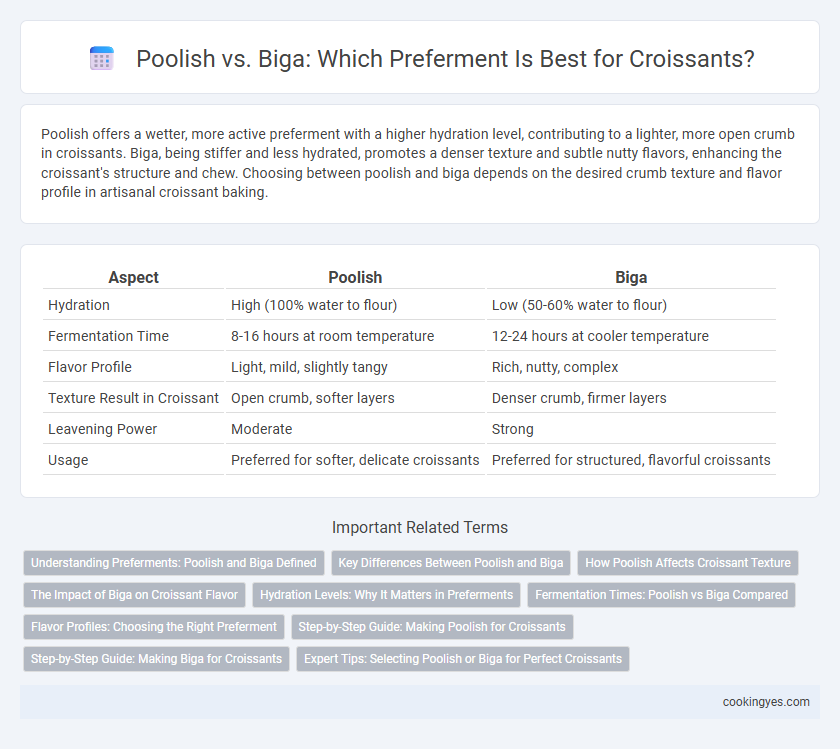Poolish offers a wetter, more active preferment with a higher hydration level, contributing to a lighter, more open crumb in croissants. Biga, being stiffer and less hydrated, promotes a denser texture and subtle nutty flavors, enhancing the croissant's structure and chew. Choosing between poolish and biga depends on the desired crumb texture and flavor profile in artisanal croissant baking.
Table of Comparison
| Aspect | Poolish | Biga |
|---|---|---|
| Hydration | High (100% water to flour) | Low (50-60% water to flour) |
| Fermentation Time | 8-16 hours at room temperature | 12-24 hours at cooler temperature |
| Flavor Profile | Light, mild, slightly tangy | Rich, nutty, complex |
| Texture Result in Croissant | Open crumb, softer layers | Denser crumb, firmer layers |
| Leavening Power | Moderate | Strong |
| Usage | Preferred for softer, delicate croissants | Preferred for structured, flavorful croissants |
Understanding Preferments: Poolish and Biga Defined
Poolish is a highly hydrated preferment, typically a 1:1 ratio of flour to water with a small amount of yeast, producing a loose, sponge-like mixture that enhances dough extensibility and open crumb structure in croissants. Biga, an Italian preferment, has a stiffer consistency due to lower hydration, offering a slower fermentation process that develops more complex, nutty flavors and improves dough strength for better lamination. Understanding the differences between poolish and biga allows bakers to tailor croissant texture and flavor profiles, balancing softness and crispness through fermentation control.
Key Differences Between Poolish and Biga
Poolish is a loose, watery preferment with equal parts flour and water, resulting in a wetter consistency ideal for enhancing croissant dough extensibility and flavor development. Biga, on the other hand, is a stiffer Italian preferment with lower hydration, contributing to a stronger gluten structure and a chewier texture in croissants. These differences influence fermentation time, dough handling, and the final crumb and crust characteristics of croissants.
How Poolish Affects Croissant Texture
Poolish as a croissant preferment enhances dough extensibility and gas retention, yielding a lighter, more open crumb structure with delicate flakiness. Its higher hydration compared to biga promotes enzymatic activity, resulting in improved flavor complexity and a softer, more tender crumb. This characteristic makes poolish ideal for croissants aiming for an airy texture and subtle tang.
The Impact of Biga on Croissant Flavor
Biga, a traditional Italian preferment with a stiff consistency, significantly enhances croissant flavor by promoting complex fermentation and developing deeper, nutty notes. Compared to Poolish, Biga's longer fermentation time and lower hydration create a more pronounced aroma and richer taste in the final pastry. This impact on croissant flavor stems from Biga's ability to foster lactic acid bacteria and wild yeasts, contributing to a superior, artisanal flavor profile.
Hydration Levels: Why It Matters in Preferments
Poolish and biga differ primarily in hydration levels, which significantly impact croissant dough development and final texture. Poolish is a wetter preferment, typically at 100% hydration, promoting a more open crumb structure and enhanced enzymatic activity for better flavor complexity. Biga, with lower hydration around 50-60%, results in a firmer dough that contributes to a tighter crumb and a denser, chewier croissant texture, making hydration a critical factor in preferment choice.
Fermentation Times: Poolish vs Biga Compared
Poolish fermentates croissant dough faster, typically requiring 8-12 hours at room temperature, resulting in a lighter texture and subtle tang. Biga, with a longer fermentation time of 12-24 hours, emphasizes flavor complexity and a denser crumb due to its lower hydration and slower yeast activity. Choosing between poolish and biga impacts croissant development by balancing fermentation duration, dough hydration, and the desired final crumb structure.
Flavor Profiles: Choosing the Right Preferment
Poolish preferment imparts a mild tangy flavor and enhances the airy crumb of croissants, lending a slightly sweet aroma and pronounced yeast notes. Biga offers a nuttier, more complex flavor profile with subtle acidity, resulting in a denser texture and a golden crust. Selecting Poolish or Biga depends on the desired balance of lightness versus depth of flavor in the final croissant.
Step-by-Step Guide: Making Poolish for Croissants
Poolish for croissants involves mixing equal parts water and flour with a small amount of yeast, fermenting at room temperature for 12-16 hours until bubbly. Start by dissolving 1 gram of instant yeast in 100 grams of water, then stirring in 100 grams of bread flour to create a loose batter. The resulting poolish enhances flavor development and dough extensibility, producing lighter, flakier layers in the final croissant.
Step-by-Step Guide: Making Biga for Croissants
Biga, an Italian preferment, enhances croissant dough by improving flavor, texture, and fermentation control. To make biga for croissants, combine flour, water, and a small amount of yeast, then ferment at room temperature for 12 to 16 hours until bubbly and aromatic. Incorporating biga into croissant dough results in a tender crumb and rich, complex taste distinct from poolish, which is a wetter preferment.
Expert Tips: Selecting Poolish or Biga for Perfect Croissants
Poolish, a wet preferment with a higher hydration level, promotes extensibility and a delicate crumb ideal for flaky croissants, while biga, a stiffer preferment, enhances dough strength and imparts a nutty flavor with a more structured texture. Expert bakers recommend poolish for softer, tender layers and biga for croissants that require a pronounced chew and open crumb. Selecting the preferment depends on desired texture and flavor profiles, with poolish favoring moisture-rich lamination and biga contributing to traditional Italian-style bite and aroma.
Poolish vs Biga for Croissant Preferment Infographic

 cookingyes.com
cookingyes.com